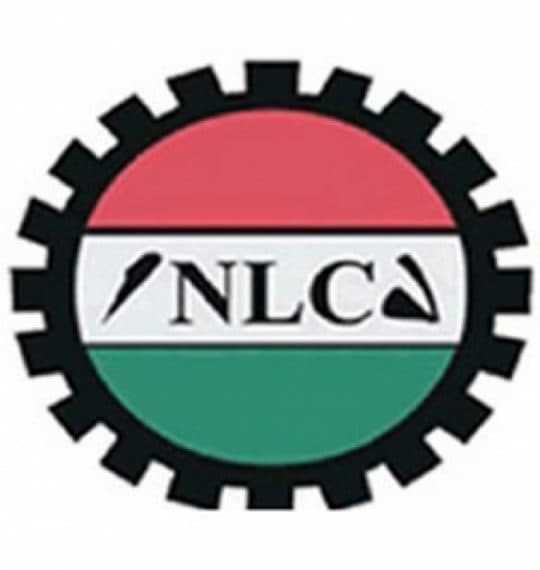By: Mercy Peter
The Nigeria Labour Congress has suspended its planned nationwide protest against the recent 50 per cent hike in telecom tariffs.
The change of heart followed a meeting with government representatives at the Office of the Secretary to the Government of the Federation in Abuja, on Monday.
NLC said it would give room for further discussions.
Speaking to journalists after the meeting, NLC President, Ajaero, said the government had agreed to set up a larger committee to review the entire tariff structure.
According to him, the committee will be composed of five representatives from both sides and is expected to submit its findings within two weeks.
Ajaero stated, “We emphasised that the NLC is the largest organisation in Africa, and no stakeholder consultation can exclude us and still stand. On that basis, they agreed to form a broader committee to ensure a fair and inclusive agreement to look at the entire tariff structure as a model to come out with a realistic and all-inclusive agreement.
“So, the committee will be made up of five representatives, from both sides and expected to come out with a result after two weeks. That will determine the next line of action and the process of engagement.’’
He added that the union’s next steps, including protests, boycotts, or service withdrawals, would depend on the outcome of the committee’s work.
“The symbolic action of submitting the letters tomorrow (today) will be put on hold until the outcome of such a committee. The outcome of such a committee is what will determine our next line of action in terms of protest, in terms of boycott, in terms of even withdrawal of services, which are the three issues we put online,” he explained.
While the planned symbolic submission of protest letters had been put on hold, Ajaero noted that the NLC remains concerned about other pressing economic issues, including electricity tariffs and burdensome taxes on workers.
“We have also expressed our displeasure over the high electricity tariff and the unbearable tax regime, which is killing workers. These remain unresolved issues that must be addressed,” the labour leader said.
The Minister of Information and National Orientation, Mohammed Idris, said the NCC raised the tariff following a study.
He stated that the NLC agreed to look at the study to come up with its resolutions, adding that a committee of five representatives each from both sides had been instituted.
The minister said, “The crux of the matter is that there is already a study that was conducted by the NCC that led them to arrive at this 50 per cent increase. Now, we are discussing this with Labour.
“Labour has agreed that they will look at that study, and then a small committee has been set up to look at that study once again and come up with a final resolution for the consideration of government and Labour in about two weeks.
“So, the summary of it is that the Nigeria Labour Congress and the delegation of the Federal Government have set up a committee of five each.
“We are going to meet here continuously for the next two weeks, and at the end of the second week, we will now come up with a recommendation that we will give to the government and the organised Labour for final consideration.
“Both the organised Labour, the NLC particularly, and the government people have sat down here and have agreed on this position.
“So, there won’t be any protest tomorrow (today) by the Nigeria Labour Congress, and there will be some form of report that will come up in about two weeks from now to consider the study and other considerations by both parties.”
Meanwhile, the National Civil Society Council of Nigeria, which had initially supported the protest, also announced on Monday the suspension following a high-level meeting with the NCC.
The council, which represents over 600 affiliate organisations, had previously condemned the tariff hike and planned a mass protest to occupy the headquarters of the NCC and the National Assembly.
However, after extensive deliberations and a forensic review of the economic realities facing telecom service providers, the Council reversed its stance.
The NCSCN assembled an 11-man delegation for a four-hour meeting with NCC officials.
According to NCSCN Executive Director Blessing Akinlosotu, the council’s delegation initially approached the meeting prepared for a showdown, expecting to challenge the NCC on the tariff decision.
However, detailed presentations, economic assessments and operational data provided during the meeting led to a re-evaluation of the situation.
To ensure an objective assessment, the council formed a five-man technical committee to conduct a forensic analysis of telecom service providers’ operational costs, financial statements and annual profit margins.
Akinlosotu said, “After the tensed and robust engagement with the Management of NCC, we further set up a 5-Man Technical Committee to carefully study documents presented to us, and asked the Committee to do clinical and forensic examination of available records of operational costs and annual profits margins of some major Telecom Service Providers in Nigeria, with critical assessments of Financial Statements.
“Our findings were very interesting and calls for serious review of position and planned line of action.”
The committee’s findings revealed that telecom operators had not increased tariffs since 2013 despite inflation and harsh economic conditions.
The telecom regulator, the Nigerian Communications Commission, had defended the 50 per cent tariff increase, citing rising operational costs driven by inflation, foreign exchange fluctuations, and higher energy expenses.
In a statement, the regulator said the adjustment was in line with its mandate under the Nigerian Communications Act, 2003 to ensure the financial sustainability of the telecom sector.
However, the NLC rejected the tariff hike and demanded a reduction to five per cent, threatening a nationwide protest if its demands were not met.
It condemned the hike as insensitive and unjustifiable, arguing that it would impose an extra burden on Nigerian consumers.



